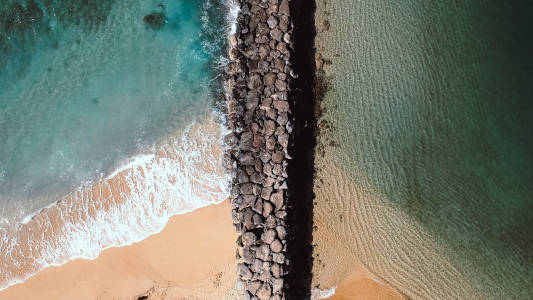What is Jetty Fishing?

Jetty fishing is fishing off jetty rocks for fish that are associated with either the jetty structure itself or nearby features like channels or current breaks. This page just deals with fishing jetties in saltwater as freshwater jetties tend to be similar to fishing any other hard shoreline structure. Some fish that are associated with the submerged rock structure include black sea bass, tautog, cunner, slippery dick, triggerfish, sheepshead, and spadefish. Some fish that are associated with the adjacent water features include flounder, striped bass, bluefish, red drum, weakfish, and sea trout. Jetties are typically hotspots for fishing and many more fish species can be caught than just mentioned previously.
Jetty fishing is typically done with longer rods for two reasons. One to reach out for distance into channels and inlets when the fish are that far out. The second is to help keep your lure or rig from snagging the rocks that are just below the waterline. The rod length is location dependent, for some jetties where snags aren't that bad, no backcasting room is available, or the extra length is fighting against you, a short rod can be used instead. Rods that can handle high sticking and banging around rocks are also appreciated by anglers.
Sinker selection for bottom fishing will be less snaggy options like a bank sinker or cannonball sinkers and you will generally want to avoid sand sinkers like a pyramid or frog tongue. When fishing with weighted, sinking lures like bucktails or jigs you will generally want to use a size that gets down and occasionally kisses the bottom without constantly dragging.
Fishing jetties requires some safety gear and precautions to avoid injury and mishaps. Wet jetty rocks are extremely slippery, even more slippery than ice, any time a rock is wet or has algae / slime on it extreme caution is warranted. Cleated boots or overshoes are an essential piece of gear to keep you safe when walking on jetties. Some fishermen even go as far as wearing pads or protective clothing to help protect them from falls on the rocks.
If fishing for meat, long-handled gaffs can be an extremely useful tool to bring with you on the jetty. Getting your fish up and over that first section of half-submerged rocks is often where fish are lost. Having a gaff to securely land fish you plan to harvest can mean the difference between leaving with a full or empty cooler.